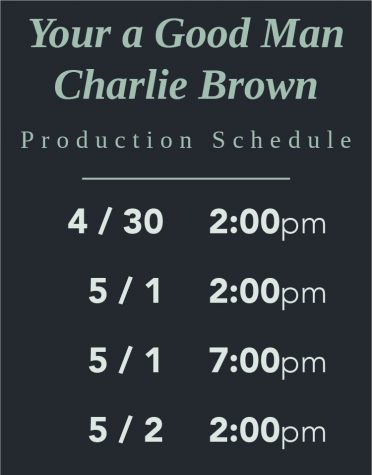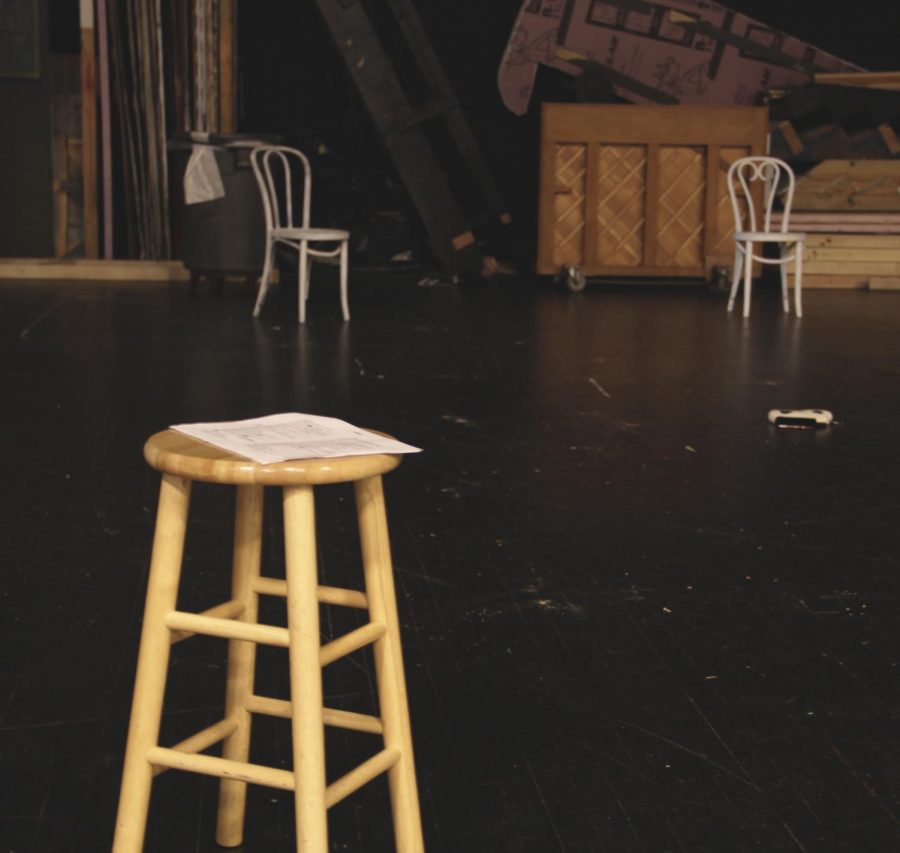You’re A Good Man Charlie Brown
A look into the casting process for the upcoming small cast musical

With COVID-19 completely destroying almost everything good in high school, there are some groups finding ways around it. Doing the usual 50 plus person cast this year would be tricky. If one person contracted COVID-19, then there would be a possibility that half, if not the entire cast would have to quarantine. With the fall musical canceled, Micah Hensley, the school theatre teacher, was determined to find something else that could be put together quickly, but at the same time look good on stage. After hours and days of searching it was decided on a small cast musical. A small cast musical is a great way to showcase three to 10 actors singing, dancing, and acting skills. In this year’s small cast musical, there are six actors. Four are male roles and two are female roles. The characters include; Charlie Brown, Lucy, Linus, Sally, Schroeder, and Snoopy. Production dates go as follows; Opening night is Friday, April 30th at 7:00 PM, Saturday, May 1st at 2:00 PM, Saturday, May 1st at 7:00 PM, and Sunday, May 2nd at 2:00 PM.
Lee’s Summit High School’s production of “You’re A Good Man Charlie Brown” held auditions on March 16th in the PAC. For future shows, audition packets tend to always be available in Mr. Hensley’s classroom and the PAC lobby. When receiving the audition packet, make sure to thoroughly read the contents inside. As said in the packet, “Very IMPORTANT information is discussed in these following pages. You are responsible for this information so please read it thoroughly so that you don’t find yourselves ignorant of important information.”
The audition packets explains everything that there is to know about auditions, production dates, voice lessons, etc. As well as character analysis, sheet music, and passages from the show that should be rehearsed during one’s own time, preferably memorized and ready to go when walking through those PAC doors for auditions!
According to the audition packet, all actors will be expected to arrive at rehearsals immediately after school Monday through Friday beginning at 2:40. As always, rehearsals are for working, not playing! Considering actors will only have a month to put the show together, it can be assumed that Hensley will be very stern with this policy. Every actor will have voice lessons with the choir teacher Chris Munce. There is only one overall director, which again is Hensley. This means the only one who should be giving stage directions is the director. Actors should only take direction from Hensley and never from anyone else. This includes friends, castmates, and family members. “Seniors, this means you too, it is not your place to give direction and it will not be tolerated.”
Cast members are expected to be professional at rehearsals. While this means showing up to rehearsals consistently and on time, always having a positive attitude about corrections given towards another by the director, carrying a pencil to write down blocking in the script, always having the script whether in backpack or hand depending on what the director wants, paying cast fees on time, etc., it also means being respectful towards other castmates. “We will be abiding by a NO GOSSIP POLICY. This means anyone caught doing so will be dismissed from the show.” In other words, if one has a problem with another castmate talk it out with them outside of rehearsal. Do not talk about them behind their backs to another person if it will not help the situation. If the situation is bad enough, tell an adult who could help fix the problem.
When participating in the acting portion of auditions, one must know that the audition will consist of a performance of a monologue or short segments of the musical. These can be found on the back of the audition packet. They should be fairly easy to memorize quickly. Remember that how prepared one is for auditions tells Hensley a lot about the work ethic they have. With all that being said, there are certain things an actor or actress could do in order to have a better auditioning experience and a better chance at being cast. Below is a list of tips that can be used for future auditions in musicals, plays, and one-acts.
Tips For Future Auditions:

❋ Make sure to grab all audition materials needed. Read everything in the packet!
❋ Many times there is a cast fee, so make sure you know how much it is.
❋ Memorize the lines provided as well as you can. This will give a clear advantage and more room to focus on the acting rather than remembering what line comes next.
❋ There are many different ways to memorize quickly. One of the best ways that some actors have found is the “first letter” technique. Start by writing down the first letter of each word on a piece of paper. For example, if the line I was memorizing was “To be, or not to be,” then what I would write down is “T b, o n t b”. Make sure to add any capitalizations, commas, etc. as needed. Read over the original line three times, then try saying the line by looking at the letters on the paper. Once you have got the line memorized, put the paper down and go off of memory.
❋ Make sure to eat a good lunch. The last thing needed at an audition is the sound of your stomach making the sound of a whale’s mating call! This is an after-school event after all, so it could take an hour or two. Stay hydrated as well. That way you will be fully energized and ready to go.
❋ There have been many people who have not auditioned for musicals simply because of the singing portion of the audition. Remember, you do not have to be the next Beyonce. Have confidence in yourself, memorize the song, and go for it!
❋ Mistakes happen and no one is perfect. If you feel as if your audition did not go as planned, do not sweat it, and do not apologize. If you begin singing a song and mess up halfway through, do not stop and say “I’m sorry.” Keep singing! This shows the director how flexible you can be when it comes to messing up. If you messed up on stage during the actual performance in front of the audience, would you stop the show to say “Sorry,” or would you continue the performance? The director wants to see you continue as if nothing happened to see how well you could handle that.
❋ Do not watch the director when auditioning. Staring down the directors while singing is not the best thing to do. Instead, do not gaze at anyone. Not even other friends auditioning. Instead, stare above their heads towards the back of the PAC. This is what you would be directed to do during a typical performance. This will also prevent most of the nerves that come with singing in front of others.
❋ Remember that it is okay to be nervous because that means you care!





